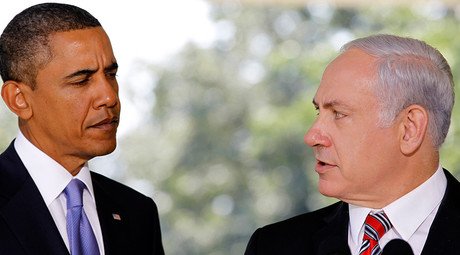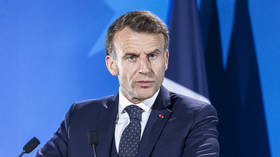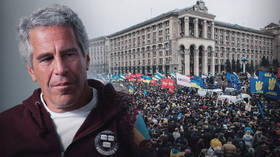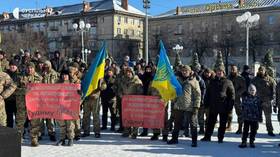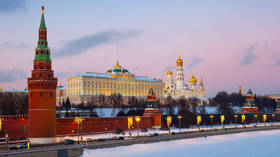Nasrallah vows vengeance on Israel, accuses Netanyahu of seeking to legitimize annexed Golan
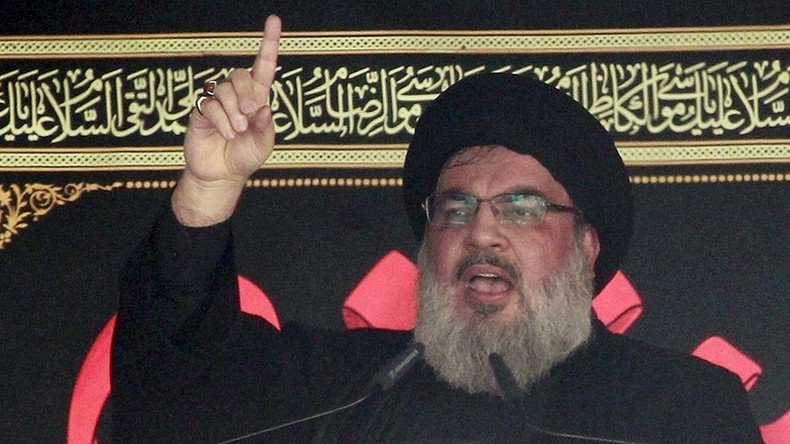
Israel is using the chaos created by the Syrian conflict to legitimize its annexation of the Golan Heights, head of Lebanese Hezbollah, Hassan Nasrallah, told his followers, while threatening “retaliation” for Israel’s killing of their commander in Syria.
“We all followed and know well how Netanyahu put a great deal of effort with the American leadership and Western governments in the past years and still does till today, to obtain international recognition of Israel’s annexation of the Golan Heights under the excuse of the Syrian conflict,” Nasrallah said in a weekend speech.
Israel seized the Golan Heights from Syria after the 1967 Six-Day War, which created an armistice line under Israeli military control. Syria unsuccessfully tried to retake the Golan Heights during the 1973 War. An armistice was concluded in 1974, resulting in a UN observer force being deployed along the ceasefire line.
Israel unilaterally annexed the Golan Heights in 1981 – a move that is not recognized internationally – and has built more than 30 Jewish settlements in the area over the last three and a half decades. Since the start of the Syrian conflict, Israel has carried out a number of military operations when fighting has neared the area.
“When the activities of the resistance started near the Golan, Israel grew very anxious, and it started retaliating in a disproportionate manner to any shelling or gunfire on the border, even if it did not cause casualties,” he said.
There have been some media reports claiming that Prime Minister Benjamin Netanyahu recently raised the issue of the Golan Heights with US President Barack Obama. A number of Israeli politicians have also floated the idea of legitimizing Golan’s annexation.
Hezbollah’s leader’s remarks were broadcast in a lengthy televised address a week after the death of Hezbollah commander Samir Kuntar, who was killed in a suspected Israeli airstrike on his home in Damascus.
Having spent three decades behind bars for a terror attack against Israelis, the 53-years-old Kuntar had become an iconic figure for the Hezbollah movement. He was a Druze member of the Palestine Liberation Front from Lebanon and was eventually released in a prisoner exchange between Hezbollah and Israel in 2008.
Nasrallah threatened Israel with retaliation for Kuntar’s murder in his speech and called on anti-Israeli fighters to unite and push Israel out of the Golan Heights.
“The response for the assassination of al-Kuntar is coming, there’s no doubt. The Israelis have a reason to be worried, in the border area and outside it,” Nasrallah said, adding that the response was “now up to the resistance fighters.”
Nasrallah also said that if “all efforts in Syria, Iraq and other countries where conflicts are taking place were joined together, the Israeli entity would be wiped out.”
READ MORE: ISIS leader threatens Israel, calls for revolt in Saudi Arabia
The speech coincided with threats made by Islamic State (IS, formerly ISIS/ISIL) against the Jewish state, which were expressed in a lengthy audio address attributed to the terror group’s self-proclaimed “caliph.” It also comes as the IDF announced the formation of a Commando Brigade that will incorporate the best of the best of Israeli special forces amid a growing threat to the state.
The new force will incorporate the elite Egoz, Duvdevan, Maglan, and Rimon units to carry out long-range raids and lengthy covert operations in the heart of enemy territory.
“The IDF Commando Brigade will be a front line protector and a marker of the IDF’s abilities and spirit,” IDF Chief of General Staff Lieutenant-General Gadi Eizenkot said at the inauguration of the new fighting force.
“You don’t need a wide understanding of intelligence or strategy to understand the sensitivity of this period. You look to the north and see the boastful statements and the wind blowing in from Lebanon,” the Lieutenant-General said. “You see the threats last night by ISIS, and the wave of security escalations we've been contending with in the past few months in the West Bank and the threats from the south – these make the capabilities we see here more necessary than ever.”
